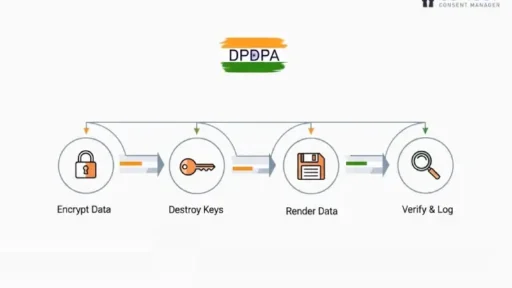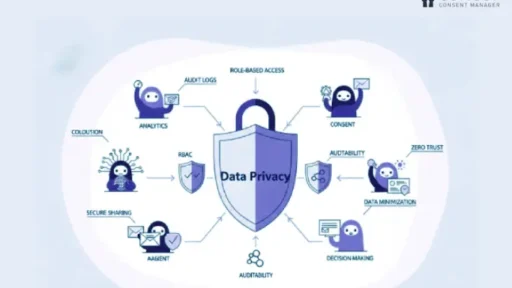The Digital Personal Data Protection Act (DPDPA), passed in 2023 and anticipated to be implemented in phases until 2025, significantly impacted how Indian startups manage personal data. The DPDPA is transformative in the legal landscape as it imposes new obligations on those collecting or processing personal data. DPDPA compliance is now a legal requirement regardless of whether you are a two-person startup or a highly-regarded venture-backed company. It places data governance front and centre and pushes startups to develop privacy-first systems and policies from scratch.
DPDPA empowers users, who are now referred to as Data Principals, by providing them rights over their personal data while placing responsibility on startups – now a Data Fiduciaries – for their collection, usage, storing and sharing of data. It is not just a legal formality, but a fundamental transformation, which will shape product design, marketing strategies, data infrastructure and consumer trust for many years to come.
DPDPA Implementation Timeline (2023–2025)
The Digital Personal Data Protection Act was officially signed into law in August 2023 and since then, the Indian government has taken a phased approach to implementing it.
They released draft rules and technical guidance to provide companies with the opportunity to comply with the act. By early 2025, the government had released detailed draft rules that focused on user consent, breach notification procedures, and compliance frameworks for Significant Data Fiduciaries (SDFs). These drafts provided clarity and were the catalyst for compliance initiatives across the startup ecosystem.
By mid-2025, the government had established a consent management framework, and had implemented the institutional setup to enforce the act (i.e., the Data Protection Board). With these developments, it is clear that compliance is no longer voluntary or plausible to delay, and companies now need to get their act together to comply with the law.
Core Compliance Obligations for Startups
1. Purpose Limitation for data
The DPDPA principle of data minimization says startups can only collect the data needed for the purpose. If a startup has existing data and wishes to use it for a new purpose, the startup must obtain new consent from the user. Using personal data for purposes not related to the reason for which the data was originally collected can lead to sanctions from regulators and potentially irrevocable harm to a startup’s reputation.
2. legacy Consent
Under the DPDPA, startups must revisit all old user consents collected before the law came into effect. These legacy consents are no longer valid unless they meet the Act’s new standards. Startups must send a fresh, clear notice to users explaining what data they have and why, and get explicit consent again. If users don’t re-consent, the data cannot be used. Ignoring this could lead to legal penalties and loss of user trust. Revalidating legacy consent is the first step toward full DPDPA compliance.
3. Collect Informed Consent
Startups can only collect user data after securing express, informed, and voluntary consent from individuals. The law states that you cannot use pre-checked boxes, avoided terms, or vague notices to secure consent. The startup must tell each user exactly what data they are collecting, why they are collecting that data, and how the startup will use the data. Users are also required to be provided with a straightforward way to withdraw their consent at any time, and not to lose access to main services. Presenting a clear privacy notice before collecting data is not just a best practice in business. It is also a legal obligation.
4. Data Security
Security is no longer simply an IT issue, but a legal obligation. Startups must use strong technical and organizational measures to protect personal data. This includes encryption of sensitive data both ‘at rest’ and ‘in transit’, access controls, monitoring for suspicious activity, and audit logs. Failing to ensure security may result in penalties of up to ₹250 crore, and may destroy customer trust in their startup permanently.
5. Enable Data Principal Rights
Startups are required to provide users with mechanisms to exercise their rights under the Act. This will include the right to access their information, correct any inaccuracies, delete information about them which is no longer being used, and to withdraw consent. User dashboards or the use of third-party privacy platforms can be used to partially automate this process. Ignoring or failing to provide users with their rights can lead to user complaints and an eventual investigation by the Data Protection Board.
6. Report Breaches Promptly
Under the law, startups must notify both impacted users and the Data Protection Board in a reasonable time frame after becoming aware of the breach. While the law does not stipulate a specific time frame, it will include regulations in the future. From an industry best practice perspective, most companies will report a breach within 72 hours of becoming aware of it. Depending on the nature and circumstances of the breach, notifying affected users (and the Board) later means you may see increased fines or scrutiny from the regulators.
Who Is a Significant Data Fiduciary (SDF)?
The government will likely designate any entity a Significant Data Fiduciary on a number of factors, including amount/type of data the money service is processing, potential risks to national security or public interest, and/or the use of advanced technologies (e.g., artificial intelligence) to make decisions, profile, or otherwise determine agency actions.
Once labeled an SDF, a startup must comply with a hard set of elevated obligations. These obligations would require, among other things, the completion of regular Data Protection Impact Assessments (DPIAs) to assess and mitigate privacy risk, independent data audits, hiring a Data Protection Officer, and adhering to additional data localization obligations. Not only do these obligations add to startup compliance, but they will hopefully reduce harm to high-risk data ecosystems.
More Detailed Explanation: Decoding Significant Data fiduciaries and Non-Significant Data Fiduciaries Under DPDPA
Startup Challenges Under DPDPA
1. Limited Resources
Many Indian startups are often cash-strapped and think they have not enough people. DPDPA compliance requires investment and know-how in privacy law, cybersecurity and data governance. This is particularly complicated for early stage companies trying to figure out product-market fit.
2. Evolving Guidelines
Many procedural rules of the DPDPA are still being developed, meaning uncertainty for Indian startups. The guidelines pertaining to children’s data, age verification for data subjects, cross-border data transfers and grievance redressal are not yet finalised. Startups will need to remain nimble, keep track of regulatory updates, and modify their compliance processes where needed.
3. Third-Party Risks
It is usually the case that startups rely on third-party service providers for most functions (e.g. payments, analytics, cloud storage and marketing). The DPDPA states that startups remain responsible for third party service providers. Therefore, if a third party processor mishandles data, the startup is responsible. Startups in India should therefore perform due diligence and have data protection agreements with all vendors.
4. Cost of Compliance
Enforcing DPDPA compliance does not come for free. Indian startups should plan to spend money on legal consultation, IT updates, security tools, employee training and ongoing monitoring. It is likely that the penalties for non-compliance would be many times greater than the cost of proactive enforcement.
Industry-Specific Impact
1. Fintech
Fintech startups in India manage very sensitive financial data, so they are probably classifiable as SDFs. These startups must protect KYC, Aadhaar, transactions, and behavioral datasets using encryption in accordance with SDF obligations. Lastly, Fintechs also have an obligation to do DPIAs for algorithmic decision-making tools.
2. EdTech
Indian edTech startups collect children’s data, consequently triggering rigorous safeguards. They must collect validated parental consent (and may not exploit children’s data for tracking, targeted advertisements, or behavioral analytics) and they are required to employ distinctly discernable age-verification mechanisms.
3. E-commerce
Indian e-commerce startups manage customer data, user’s purchases and address data. They must allow customers to withdraw consent for promotional campaigns, maintain consent logs for reference, and follow data minimization principles. They must also work closely with seller platforms and logistics partners to ensure compliance throughout the value stream.
4. HealthTech
Indian healthTech startups collect and process sensitive health and biometric data. The DPDPA identifies this kind of data as highly sensitive and deserves the utmost protection, which may include full data encryption, access restrictions and clear.user consent procedures.
5. AdTech
Indian adtech companies often rely on cookies and tracking pixels to collect user behaviour data. Under DPDPA, they must have informed consent for tracking, never profile minors, and disclose the extent to which algorithms shape user behaviour. Transparency and accountability become the main differentiators.
6. SaaS
Indian Software-as-a-Service firms interacting with enterprise clients need to establish end-to-end compliance for themselves and the enterprise clients. The companies must observe global standards to accommodate cross-border business, including a GDPR-type data processing agreement, an audit readiness program, and an incident response plan.
Benefits of Compliance
Creating a DPDPA-compliant Product or Platform has multiple long-term advantages. First, implementing privacy compliance gives users confidence and trust that their data is safeguarded in its use. Secondly, in respect to compliance, it gives startups a leg up when dealing with investors, enterprise clients, or global partners that prioritize privacy compliance. Thirdly, startups that evolve with privacy priorities have an innate advantage in global markets that have existing strict data protection legislation. Fourthly, they may see potential benefits from government recognition or funding. Especially with privacy technologies or in sectors of national digital public infrastructure.
Compliance Checklist for Indian Startups
- Map all personal data flows and classify data by category and sensitivity.
- Update privacy notices, terms of use, and third-party contracts to align with DPDPA.
- Implement consent capture tools and maintain logs for auditing.
- Encrypt all sensitive personal data and ensure role-based access control.
- Appoint a Data Protection Officer or privacy lead responsible for oversight.
- Offer clear user interfaces for accessing, correcting, and deleting data.
- Create a robust breach notification and mitigation plan.
- Maintain internal compliance records and audit trails.
The New age of Privacy with DPDPA
The DPDPA represents an important new chapter in India’s digital economy by centering user privacy in how data is governed. While the legislation is undoubtedly a challenge for startups, it also brings opportunities for innovation. It offers legitimacy in global markets and helps build trust for the longer term. Startups that take action early, change as required, and build privacy into their product DNA will be much better placed to navigate this market. Far from an impediment, compliance can be a strategic advantage that lays the groundwork for sustainable success in the digital age.
How concur can help you
Concur is well-known as one of the best consent management platform (CMP) making DPDPA compliance easier for Indian startups through a strong, scalable, and connected platform that handles privacy obligations without sacrificing agility. Concur offers a single solution for real-time consent capture and automated user rights workflows to ensure legal compliance and uphold customer trust. Designed to integrate with fast-moving products, the platform is purpose-built to ensure the same level of precision and transparency in data protection as required in other fast-moving industries including fintech, healthtech, SaaS, and edtech.
Key features include:
- End-to-end consent lifecycle management, integrated directly into your product
- Pre-built compliance workflows for user rights, breach handling, and audit trails
- Dashboards and alerts for real-time monitoring of compliance status
- Expert onboarding and support, tailored for early-stage teams
Book a demo now to experience seamless DPDPA compliance in action.








